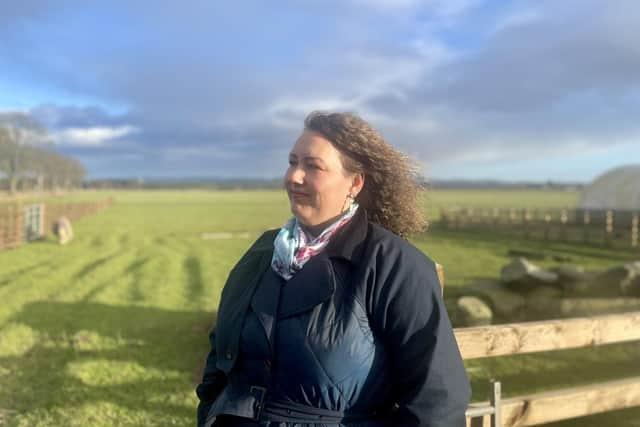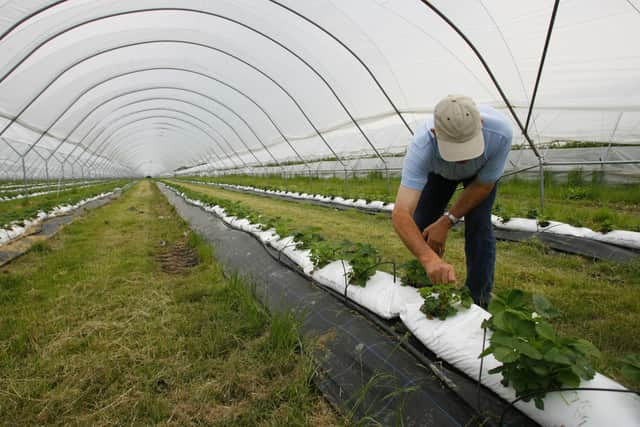Seasonal agriculture workers report exposes culture of fear and poor working conditions persist on Scottish farms
Poor accommodation and working conditions, lack of safety regulations and a gap in understanding visa conditions have been cited as concerns that persist for seasonal workers coming to farms in Scotland, according to a new report.
A growing trend of social media groups being infiltrated by people connected to farms to prevent vital information on workers’ rights being shared have also shown “a worrying increase”, the research has shown.
Advertisement
Hide AdAdvertisement
Hide AdThe report, seen exclusively by The Scotsman, was done by caseworkers who work for the Workers Support Centre Scotland (WSC). The WSC, founded last year, said it is the only official organisation that provides free support to foreign seasonal workers, such as soft fruit pickers, north of the border.


WSC spoke to 405 individuals who were on the Seasonal Worker Visa (SWV) between June and December last year for the study. There were about 6,570 seasonal workers in the horticulture sector overall in this timeframe.
Caseworkers said while 149 cases and 256 enquiries came out of the interviews, nearly half of all workers raising workplace-related issues decided not to proceed with action, which they said highlighted a culture of fear across some of Scotland’s farms.
Working conditions
Working conditions were cited as the main concern from those interviewed for the report, with the most common issue being a lack of overtime payment.


The second most reported concern was workers being dismissed if they made a complaint, which caseworkers said left them more vulnerable to exploitation. Health and safety was also cited as an issue across farms, with the most common being unaddressed injuries at work, which workers reported “in high numbers”, the report said. Caseworkers said this was significant in the context of the Health and Safety Executive documenting “27 farming or other agriculture related fatalities” across the UK last year.
Accommodation standards on some farms were also referenced in the report, with some workers reporting living in damp caravans, and with broken windows and rodent infestations. The Home Office has indicated it plans to complete a review of the seasonal worker route and said it will publish a plan for this “in due course”.
Visa issues
SWV-related matters were identified as the second highest concern after working conditions, with caseworkers saying there is a “serious gap in understanding” of how it works.
While the visa may last six months, and there is a mandatory 32-hour week that comes with it, workers can still be dismissed at any point if, say, productivity on the ground is low.
Advertisement
Hide AdAdvertisement
Hide AdCaseworkers said this poses a financial risk for workers, some of whom have taken out “substantial debts to travel to Scotland anticipating six months work, yet finding much lower remuneration”.
Margarita Permonaite, a WSC caseworker, said: “You have people coming here who have left their families, their jobs, are probably in debt from borrowing money to travel thinking they are going to have full six months of work. But they get here and can be told there’s not enough work to fill that time.”
In some cases, when work runs out, seasonal workers can apply for a transfer to another farm. But the report also found issues with this process.
The SWV is connected to a licensed Home Office Scheme Operator rather than the workers’ employer, which means an “employer transfer pathway” is established. This provides an essential safeguarding mechanism should workers want to move if they are being exploited.
But WSC’s report identified of those who did apply for transfers, 41 per cent were refused. The report said in many cases, workers were requesting transfers because they were “being treated very poorly”.
“If their transfer is rejected, they might just get told to go home, but that’s expensive,” Ms Permonaite said. “We have seen cases where the farmer gives a worker three days to leave, but some haven’t got enough money to return home, so they end up homeless here or go into the black market.”
The Home Office said the transfer pathway does not guarantee a system where workers can switch operators.
Growing exploitation trends
In other cases, caseworkers said they had noticed “a worrying increase” in Telegram groups – an instant messenger service – administered by people connected to farms or labour providers who actively remove people from chats who provide information about workers’ rights.
Advertisement
Hide AdAdvertisement
Hide AdThe report said this vacuum of support creates opportunities for third parties to take advantage and charge a fee for support services.
With many workers unable to speak English fluently, the report pointed to concerns about the lack of support and representation of workers on farms with this language barrier.
The WSC report made several recommendations to governments to bolster protection of seasonal workers, including providing independent workplace representation and more robust inspections for healthcare rights and accommodation standards.
It also insisted all labour providers should ensure all training, contracts, and details of rights are given to workers in their native languages, with independent support services such as the WSC advertised.
The WSC supported people from the following countries last year: Azerbaijan, Bulgaria, Georgia, India, Kazakhstan, Kyrgyzstan, Pakistan, Romania, Russia, Tajikistan, Ukraine and Uzbekistan.
The Scottish Government said it would carefully consider the report’s recommendations and continue to work closely with the WSC to provide assistance to seasonal workers.
A spokesperson said: “The UK Government’s inhumane immigration policies increase the risks for exploitation of seasonal migrant workers. We are continuing to do all we can within devolved powers to empower and support these workers who make a positive contribution to our country.”
A Home Office spokesperson said: “We note the contents of the report and will consider the findings carefully. We take the welfare concerns of individuals on seasonal working visas seriously, and continue to welcome workers on this designated safe and legal route to work in the UK.”
Comments
Want to join the conversation? Please or to comment on this article.